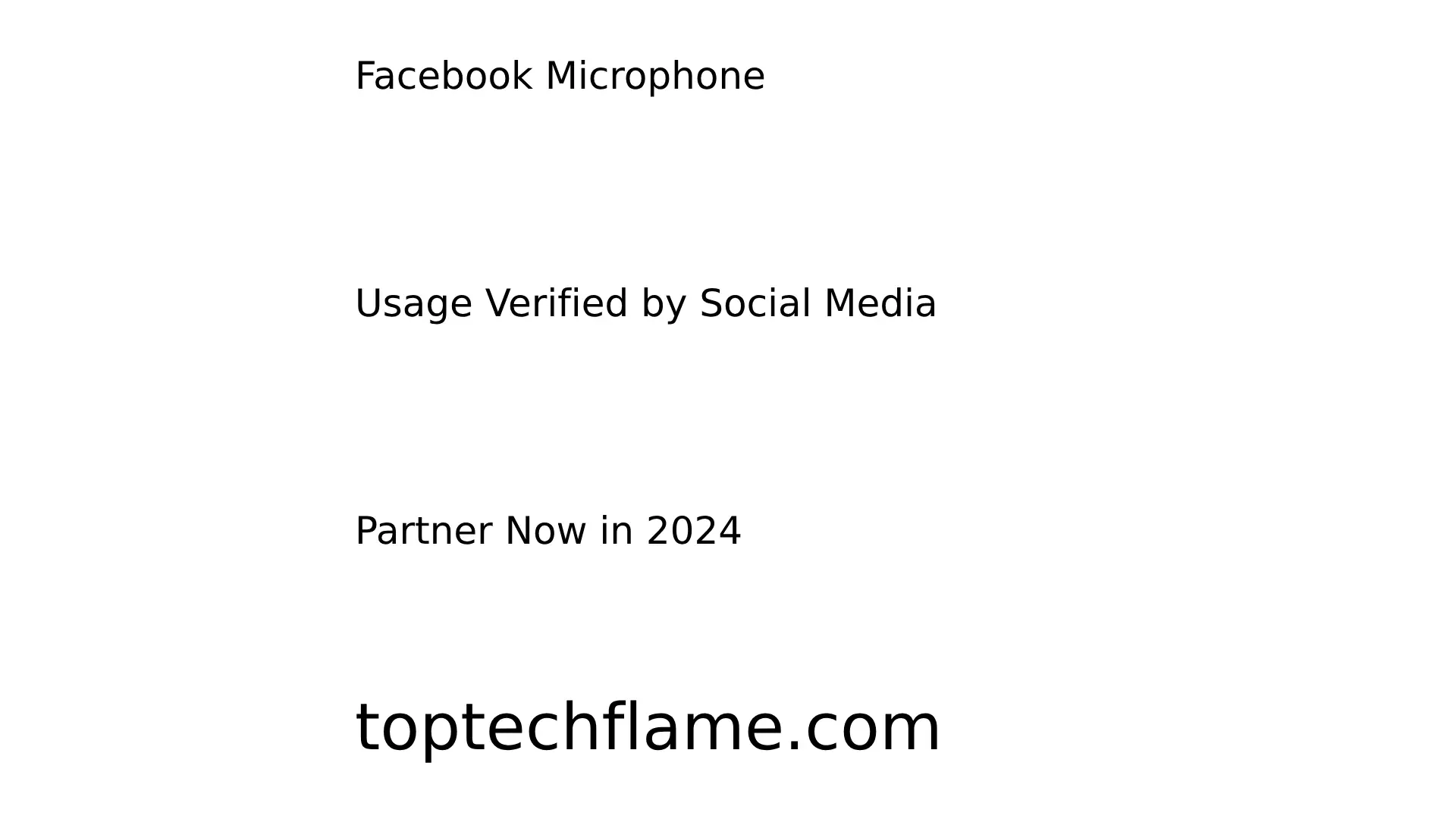Facebook Microphone Usage Controversy
The issue with Facebook microphone usage has escalated throughout the last few years. Users do not feel comfortable with social networks supposedly eavesdropping on their conversations to serve personalized ads. These have only worsened with cases where users speak about specific products in conversation, only for them to be followed by advertisements. This article reviews the recent discoveries, the applied technology, and the statement from Facebook and its affiliates toward giving perception to the current Facebook microphone controversy.
Facebook Microphone Usage Confirmed
While analyzing and providing exposure on social media advertising, the recent report made by 404 Media has surfaced some data that may put further question marks on the concept of Facebook microphone usage. It reveals that a Facebook marketing partner, the Cox Media Group (CMG), was using “Active Listening” software.
This software, an artificial intelligence tool, analyzes user conversations and then extracts necessary data in real-time to advertise the products to consumers. The purpose of this technology is to capture “intent data” out of conversations, making Facebook microphone usage the subject of discussion regarding privacy and data abuse.
404 Media obtained documents in which CMG’s pitch deck explains that this voice data will be used to improve behavioural targeting. For many users, this revelation vindicates their previous concerns about Facebook’s microphone usage and its ability to violate users’ privacy by eavesdropping on conversations and using this information to make profits.
Facebook Response to Microphone Usage Allegations
Meta – Facebook’s parent company, has emphatically refuted any part of spoken mic usage for advertising. A Meta representative later clarified that although CMG is a general partner, it did not directly participate in the so-called “Active Listening” program. Mainly, Meta went further, saying that it is unclear, so it has requested CMG to clarify whether its Facebook microphone usage was involved.
Likewise, while listed as a client of CMG, Amazon claimed that it has never had any relations with the software in the past or at the time of the report. Although the firms are trying to disassociate from such claims, the report indicates that Facebook microphone usage could be extended more than anticipated.
The Eavesdropping Myth: Is Facebook Listening to Us?
There is more to Facebook microphone usage than the 404 Media report discussed here. During an interview on CBS This Morning, the head of Instagram, Adam Mosseri, dismissed the rumour that it would not go away. Mosseri said he did not get it when users complained they get an ad shortly after talking about a product, asserting that Facebook does not spy on users’ conversations via microphones. However, many users are not confident even in his words about Facebook microphone usage.

This is more so because the Microphone used by Facebook to decide which advert to present to its users accurately determines that people are being listened to. One day, the editor of the USA Today reporter, Jefferson Graham, saw an advertisement for a company that the editor had recently advertised at a party. This, however, caused new doubts, but Graham noted that it is probably not a Facebook microphone usage. Instead, Facebook’s ingenious tracking analytics and geographical positioning software generate a feeling of electronic spying.
How can Facebook monitor you without using a Microphone?
Some of the techniques used to track the user’s behaviour by Facebook microphone usage include, through these techniques, Facebook can present high ads without Facebook microphone usage. Some of the tales have been shared by privacy experts such as Jamie Court, the president of Consumer Watchdog, who says there is no need for Facebook microphone usage because the company has mastered getting users by other means.
Facebook gathers information about users’ activity on the social media platform through cookies placed on websites and applications. It accumulates “content, communications and other information,” such as photos, videos, posts, hashtags, groups, and payment details. These are channelled to Facebook artificial intelligence, which analyzes user properties and determines the possibilities of the users’ future interests. Many assume this indicates that Facebook is listening to them through the Microphone.
For instance, Graham’s editor, the ad for Joymode, probably appeared because the company wanted to target users over 18 years residing in Los Angeles, which is a trait she has. Instead of using microphones, Facebook probably saw location-based data and noticed that the editor and her friend owned similar patterns, whereas one liked Joymode.
The Technology Behind Facebook Ad Targeting
Facebook sophisticated advertising infrastructure, including its recommender systems, is more developed than Amazon’s, as the site receives an unceasing flow of subscribers’ data. As per industry specialist Phil Lieberman, it’s not to engage again in Facebook microphone usage as AI engine can identify user intention based on the textual and visual content uploaded to the platform. However, it follows every movement from check-ins to the users’ location to create tailored advertisements.
Although this form of ad targeting has been deemed efficient, it has led to the notion that Facebook Microphone is used to spy on people. However, the real picture is of tracking rather than spying, although the senses may sound underhand.
User Experiences and Perceptions of Facebook Microphone Usage
Since users first realized that they could hear Facebook listening through their smartphones, many people held that Facebook microphone usage is the reason for its targeted ads. For example, Atlanta-based user Lily Leiva was creeped out when she was served an ad for a maternity product immediately after she used it in a dinner conversation.
Leiva’s experience is as good as millions of others who are confident that Facebook microphone usage is the only reasonable explanation for appearing in such advertisements. Privacy experts such as Paul Bischoff have noted that the Facebook tracking system is much more extensive than the average user would imagine.
From tracking activity on different networks to using location services, Facebook collects adequate information to paint a true picture of your interests. Although Facebook microphone usage is conceivable, the social network’s work and ways of obtaining and using users’ data go far beyond that.
GPS and Information Gathering by Facebook
Facebook users’ privacy invasion does not stop at providing personal information but also their geographical location. When prompting users to allow location updates, the social media giant guarantees a steady stream of users’ locations even when the app is not in use.
With this capability, along with the data gathered by the plugins and cookies on Facebook, users can share unique and more specific ads than using a Microphone without violating users’ privacy.
Specifically, Aleksandra Korolova, a University of Southern California professor, investigated Facebook’s location tracking. Even with the help of special settings, which exclude user information from being shared with third parties for location tracking purposes, Korolova discovered that Facebook followed her throughout the city and used this information for advertising.
This discovery emphasizes the level to which Facebook can collect data from users without the Microphone, highlighting issues related to privacy and consent.
Conclusion
As many people have accused Facebook conversations through users’ microphones to provide relevant ads, this remains an illusion. This also shows that the company does not spy on Facebook users to relay details of conversations to different advertising agencies.
It employs diverse techniques for collecting data, such as monitoring users’ activities, geographic location, and general internet behaviour. Through these methods, Facebook can personalize ads, making people feel like their conversations are being eavesdropped on. This perception remains so because of the platform’s unusually efficient ad targeting, which appears overly intrusive.
However, the real issue is not the Microphone; it is the other features that Facebook harvests in the same invasive manner. The information from the interactions, such as the posts, check-ins, and the location, can be utilized by advertisers to have complete profiles of the users. To avoid or minimize the use of personal information, users should become more informed of these data-tracking mechanisms and apply some measures to the information they disclose. Although microphone spying may not be accurate, knowing how Facebook gathers and compiles your details is vital in modern society while fighting for privacy.



